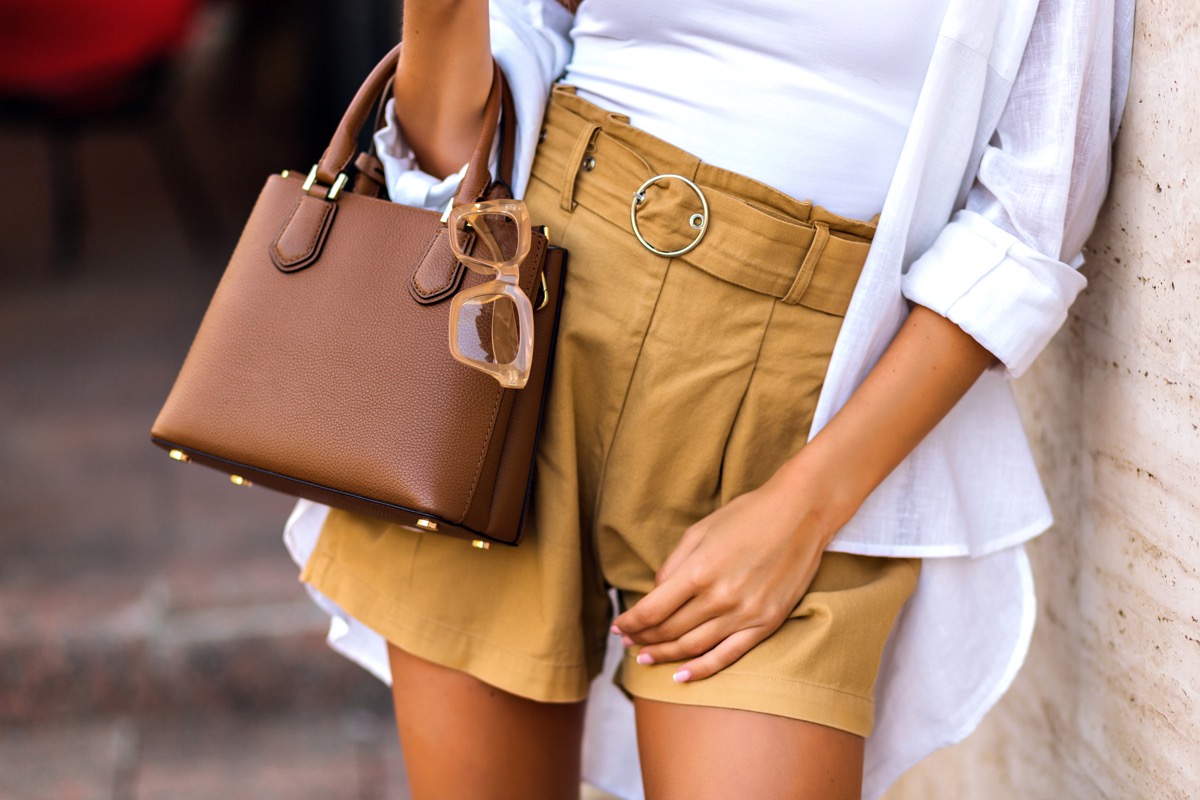23 Old-Fashioned Etiquette Rules We Still Use Today and Why

Some strict, old-fashioned etiquette rules—like where to place the gravy boat on your table or in what order to introduce guests—may seem a bit outdated for modern life. But while some etiquette books are a bit fussy by today’s standards, there are plenty of bits of advice that have lost none of their social value decades and even centuries on. In some cases, the rules have become so familiar that we continue to practice them regularly out of habit. Others help us overcome common social challenges, such as what to do when you accidentally bump into someone and don’t want them to start a fight.
Many of the social graces and customs you instinctively follow date back a long time. Here we round up 23 of these timeless niceties that don’t seem like they’re ever going away.
1. Send letters.

What once was the sole way for people to communicate with one another across distances has now become far less common, as email and texts have taken its place. But that’s what makes the act of sending a letter such a special and still-appreciated gesture.
“The first handwritten letter can be traced back to the Persian Queen Atossa in year 500 B.C.,” says Karene A. Putney, president of business-etiquette company Etiquette Etiquette. “Shortly after this time, letter-writing was used for self-education and significant trade transactions by several institutions.”
She says that today, letter writing has greater emotional resonance because it takes more time and thought than an email or text message. But it also has more relevance, as “letters are being used by some organizations to validate certain contracts and transactions.”
2. Be punctual.

We may talk about being “fashionably late” for parties or other get-togethers, but in most other situations, being on time has never gone out of style.
“Arriving late for an appointment or meal or failure to complete a project on time is considered a deal-breaker,” says Putney. “Sadly, many businesses are suffering from lack of responsiveness to appointment clock.”
She adds that the word “punctual” originates from the Latin word punctualis, which means “a point.”
“To be punctual, you must arrive at the right point and on time. Etiquette, such as punctuality, is vital and can make or break one’s reputation,” says Putney.
3. RSVP early.

You receive a wedding invite you’d usually accept but aren’t sure if it’s possible for you to make it. So you end up sitting on that invite and finally respond a week before the “RSVP by” date. That’s not cool.
“Please respond a long time before the date,” writes Maralee McKee, the Manners Mentor. “Not doing so sends a signal that you’re waiting to make up your mind because the event doesn’t thrill you on first thought.”
RSVPing close to the deadline is not great, but neglecting to RSVP at all is downright rude—and it always has been.
4. Don’t point.

When you were a kid, your parents probably told you that pointing at people is rude. That was true long before they passed on that advice and it remains so. But why? Slate’s “Gentleman Scholar” Troy Patterson explains that, “This rule dates to the primitive days when the pointing finger was considered to administer a hex—and, in its conspicuity, to risk attracting the attention of a stranger who might reply with an evil eye.”
In more recent times, the gesture has evolved into serving as an assignment of blame or accusation, making the target of the pointed finger suddenly reduced to an object. If they notice you pointing, most will almost instinctually assume it is not for a positive reason.
Even as forms of communication have evolved, pointing continues to signal disrespect.
5. Make eye contact.

“Making eye contact when speaking depicts a level of professionalism and as well assurance, particularly on the topic of discussion,” says Putney.
While some cultures may see too much eye contact as an unspoken threat or eye contact with the wrong person (e.g. someone far above your station or rank) as disrespectful, for the most part, it has long been a way to establish and maintain a level of trust during conversation and a sign of confidence on the part of the person maintaining eye contact. Fail to make strong eye contact, and, as was also true centuries ago, you’re likely to be viewed as shifty, untrustworthy, or unsure of yourself.
“As insignificant as this may seem, eye contact helps to keep your attention engaged and reduces talk fatigue,” Putney adds.
6. Stand when being introduced.

If you’re grabbing dinner with friends and someone brings along their new girlfriend or boyfriend, it’s just a little classier to stand up when shaking the person’s hand or giving them a hug. While it might be more common these days for someone to give a quick wave and introduce themselves while remaining seated, the person who makes the effort to stand is conveying both more respect for the person they are meeting and for themselves.
“Standing up when being introduced is the proper method of introduction,” says Putney. “Aside from the fact that this gives room for identification, it also indicates—regardless of the status—how respectful you are. So when being introduced, you need to stand up as a form of acknowledgment.”
7. When on a date, if you asked, you pay.

Gender roles have evolved quite a bit even in the last decade, and many of the “rules” that once served as guidelines have balanced out. But one thing hasn’t changed: the person who made the invitation for the date should foot the bill.
“This is regardless of age or gender,” says Jodi RR Smith of Mannersmith Etiquette Consulting.
Traditionally the rule may have been that “the man” should pay, but in the old days (i.e. a couple decades ago) it was usually the man who was expected to do the inviting on a date. (This obsolete rule also ignored same-sex couples.) Now, as asking has ceased to be strictly a male domain in heterosexual relationships, the rule has been clarified. And it doesn’t just go for romantic outings.
“The clarity of obligation allows the guest to accept without fear of expense,” says Smith. “For example, a wealthy friend may ask me to join her for a Broadway show. Later, I would reciprocate by inviting her out to lunch at a restaurant of my choosing well within my price range.”
8. Express gratitude.

We learn from a young age the importance of saying “thank you,” and that is because it is an important practice in countless circumstances.
“Whether it is a birthday gift, a client referral or a night out, the recipient is politely obligated not to respond in kind, but rather to express their gratitude,” says Smith.
Counselor and life coach Laura Trice explains in her TED Talk that expressing gratitude helps strengthen relationships and brings the person saying thanks as many good feelings as the person receiving it.
9. Write thank you notes.

But to make an expression of gratitude even more impactful, one should put it in writing. Just as a handwritten letter expresses more than a hastily written email, a thank you note conveys more than simply telling someone “thanks.”
“A ‘thank you’ in person during the exchange is not sufficient,” Smith says. “A written note is a low-cost, high-impact tool that encourages these interpersonal interactions.”
10. Say “excuse me.”

“When we bump into someone, we still find ourselves saying ‘excuse me,’” says Sam Whittaker, a life coach and editor at Mantelligence.
While the specific phrase “excuse me” has evolved over time (“I beg your pardon,” “forgive me,” etc.), it has served a timeless benefit of defusing a potentially volatile situation, conveying that bumping into someone or some other other small breach of social norms was done by mistake.
“We still do this because it’s still effective when it comes to avoiding conflict,” says Whittaker. “People today are more likely to just say this other than get into an argument.”
11. Offer your seat to others.

While the specifics of this respectful behavior have shifted over time (Men once were expected to offer their seats to women regardless of age or ability.), it continues to be a sign of politeness for the young and able-bodied to give up their seat—whether on a bus, in waiting room, or elsewhere—to those who are older or more in need.
“The habit of offering your seat when you’re in a crowded room or a fully packed mode of transportation, is still in effect today,” says Whittaker. “This is particularly true for those who are in perfectly good health, they still offer seats to an elderly or a pregnant woman. This is so because this habit boils down to compassion, and compassion never gets out of style.”
12. Don’t call someone too late or too early in the day.

Since we were using a rotary to dial a phone, it has been viewed as rude to call particularly early or particularly late in the day. One Mental Floss writer puts the old-fashioned cutoff as before 9:00 a.m. or after 9:00 p.m. Whether or not the person being called is up and about, getting a call at one of these times is likely to set off alarms for the recipient, leading them to wonder if something is wrong.
Another telephone rule Whittaker says never goes out of style: taking your call out of the room. While this used to mean going to a separate room where the phone would be out of earshot of others, today it means taking your cellphone elsewhere if you’re in company or a public place.
“This is all about privacy and respect,” he says. “It’s not nice to force other people to listen awkwardly to our conversation, especially when it’s a personal matter. Since we still value respect even during these modern times, stepping outside to answer a call is still a practice we see today.”
13. Dress to impress.

The distinction between “formal” and “casual” has blurred in this era when it’s less common to see suits and ties at work or black-tie dress codes enforced. Yet, it is still expected that one should show that they’ve put time and thought into their appearance—even if they’re just wearing t-shirt and jeans.
“Going out of the house dressed properly is still a rule we see being followed today,” says Whittaker. “Wearing the right clothes and maintaining a classy look are things we still see as proper and essential in order to appear presentable, which is why we are still seeing this in play.”
14. Don’t curse.

While the occasional cuss can add some spice to your conversation or texts, if overdone or used in “polite company,” swearing is still unlikely to create the impression that you are a particularly thoughtful or sophisticated person.
“Cursing in front of others, especially in public, is not only bad manners but it can come off as vulgar and rude,” says Stephania Cruz, a relationship expert at DatingPilot. ”Cursing can also make the people who are around you feel uncomfortable.”
15. Cover your mouth when you cough.

Even before the coronavirus pandemic hit the U.S., it was long understood that coughing and sneezing could spread disease. This makes the use of a handkerchief or at least one’s elbow essential social behavior. To neglect to do so—to cough or sneeze into the air or against a surface in public—is not only rude, it could be deadly.
“Right now, more than ever, this is more than just etiquette, it is for everyone’s safety,” says Lynell Ross, founder and managing editor of education advocacy website Zivadream.
16. Avoid spitting in public.

Perhaps grosser than coughing or sneezing, spitting is a habit that has long been viewed as offensive for a number of reasons.
“It’s often seen as an action of anger and disrespect, but it hasn’t always been the case,” explains a health writer for BBC. “To some people, spitting is in a class above everything—even violence.”
It still has such connotations, but as with coughing and sneezing, the disgust related to the bad habit relates now as much to concerns about health as it does manners. Many diseases are spread through saliva.
17. Avoid yawning in public.

Yawning is inappropriate in public because of what it says about the person with whom you’re having a conversation. Even if it comes as a result of the yawner being genuinely tired, it remains a sign of disinterest or disengagement with the current conversation, and it’s hard for the person speaking to avoid feeling like they are boring the yawner.
In 1993, Miss Manners advised a reader who asked whether it was inappropriate for her son to let out “frequent loud and uninhibited yawns” at home by saying, “If Miss Manners were you, she would make it clear that his mother expects to be in polite company in her own house.” The logic still holds true today.
18. Wait for the host before starting a meal.

Maryanne Parker, founder of etiquette company Manor of Manners, offers a number of timeless etiquette tips specific to dining out or at a dinner part. The first: don’t start eating until the host or hostess does.
“The host places the napkin first and the rest do follow the lead,” she says. “This comes from the time of King Louis the XIV. The noble with the higher political rank was the one to start the meal and unfold the napkin. This rule is still valid until today.”
19. Don’t season food without trying first.

You may like a lot of pepper on everything. But when dining at someone’s home, refrain from over-seasoning and certainly don’t reach for the pepper shaker before you’ve even had a chance to try the dish.
“It is perceived to be a very rude behavior and this could be very insulting to the host,” says Parker. “In other words, we express doubts of their cooking before even trying the food.”
20. Stick to tasteful topics.

Just like swearing, discussing unhappy or disagreeable topics can be fine in a number of situations, but generally are best avoided when among a mixed group of people or in a more formal setting. It doesn’t mean you have to sugarcoat every topic, but when it comes to dinner conversation, there’s a reason those who stick to fun and upbeat areas get invited back often.
“Talking about pleasant topics at the dinner table hopefully will never change—the dinner table is a place for bonding and pleasant experiences and memories,” says Parker. “While having a delicious meal, we refrain by all means of communicating heavy, difficult, and frankly unpleasant topics.”
21. Avoid private conversations in front of others.

Etiquette expert Professor Walter R. Houghton wrote in his 1883 manual American Etiquette and Rules of Politeness that one should “never engage a person in private conversation in the presence of others, nor make any mysterious allusions which no one else understands.” That still holds true. Private conversations make others feel excluded, so save those topics until you and the person it concerns are alone.
22. Eat with your mouth closed.

“Eating in general is a first signal instinct and, because of this, the etiquette rules were created for the people around to enjoy the meal as well,” says Parker. “Making bad, loud noises, which are created by the mouth being opened, can be potentially very unpleasant. This is the other reason why we do not speak while we eat.”
“Speaking at the dinner table with one’s mouth full of partial chewed food is not clearly not appetizing for the other diners,” RR Smith agrees. “But more importantly, when you attempted to speak with food in your mouth you run the risk of aspirating food into your lungs. This is uncomfortable at best and life threatening at worst.”
23. Bring a host gift.

Bringing a gift when attending someone’s gathering is always a good move.
“Visiting someone’s home for a first time always requires a genuinely presented gift, not too expensive and not too personal,” says Parker. (Think candles, a bottle of wine, or a potted plant.) “This will create better possibilities for future relationships.”
Additional reporting by Bob Larkin